|
This review (in its unadulterated form) was originally published in April, but, as today saw the re-release of an expanded version under Ripple Music, we thought it would be appropriate to break out this ol' writeup. The following is an edited and updated version. - Ed.  As obnoxious as it is to have people stoically refuse to admit that rock is, in fact, not dead, it's more obnoxious still to have a critic point out how patently absurd that statement is. So I'll refrain from falling down that particular rabbit hole. Needless to say, LA’s Void Vator plays some damn fine rock ‘n’ roll with the best of ‘em, and, from all accounts, they've got nowhere to go but up. This past April saw the release of Stranded as a 6-track EP, but here, after catching the eye of Ripple Music, it has been re-released as an album, with 2 brand new tracks in tow. If there was e’er a time to dust out the cobwebs and get back into chorus slinging high energy rock, yer looking at it. Biographical material indicates a similarity to bands as diverse as Nirvana, Pantera, Megadeth and Foo Fighters. An eclectic mix, yes, yet oddly accurate. Take quite literally any track here--let’s say "Nothing to Lose" or the dynamic "Put Away Wet," for argument’s sake--and you’ll find the best elements of the aforementioned lurking mere inches below the surface. Bottom line: if you want your rock to have it, Void Vator wears it proudly. Short tracks. Grin-inducing solos. Blatantly air guitar-able riffs, which create and subsequently release kinetic energy like one taking a boltcutter to a tightly wound coil. Straightforward head-bopping groove. Aggressively present drums. Some of the more earwormy vocal melodies I’ve heard in a very long while--and this, I mean genuinely. “Don’t bore us, get to the chorus,” riffs Grohl in some long-forgotten internet video. Rock may live and/or die by the guitar, but within the genre confines, a band’s staying power is often dependent on the vocalist’s ability to write the kind of chorus that get trapped in your head for days. Here, Void Vator succeeds remarkably. Take standout track "Inside Out," which features a hook that wouldn't go amiss in a newfound single from Audioslave or (the oft-neglected) Manman God. Lucas Kanopa’s classically gruff voice has the golden ability to inflict nostalgia-ridden glee, and if your track delivers a reaction of that pedigree, you’re doing something right. From an industry standpoint, “radio ready” has, unfortunately, become a bit of an unfortunate insult. Stranded deserves a wide audience, plain ‘n’ simple, and they’ve got the potential in spades. This album's high octane strains have graced the Sleeping Village's halls a multitude of times this year, and will likely receive some attention as we compile our end of year lists. It's dangerously repeatable, to the detriment of a certain stack of promos. This re-release includes two new tracks: "Everything Sucks" and "Monster." The former is a bit of a wildcard, featuring a doomy intro that launches into a particularly nihilistic and punky brand of garage rock. It's a lot less subtle than the rest of the tracks herein, and feels a little under-baked on it's own. That said, the asymmetrical intensity between the respective halves provides substantial interest. "Monster," on the other hand, feels like a very complete track, undoubtedly ready and able to fill the all-important closer position. This lil' number has a delightfully unrestrained quality, and feels like an accurate summation of the general vibe Void Vator continue to nail. Critically, the catchiness of each track does depend largely on the vocals. Personal preference, no doubt, but a thicker guitar tone might make these catchy-as-hell riffs a little heftier in stature. There's a thin line between remaining accessible and beating up your audience, but as it stands now, the guitar sounds a tad thin. But that aside: perhaps most importantly, Void Vator aren’t boring. If that sounds like a grossly under-applied veneer of accomplishment, know that dynamism and maintained interest are...startlingly rare. For a genre that has historically gotten by on singles and lots of filler, packing a punch with all 8 tracks is a victory. Let there be no doubt: as long as high energy bands like Void Vator are doing the rounds and writing kickass tunes, rock ain’t going anywhere. Keep fighting the good fight. Void Vator’s (highly recommended) Stranded was released Nov. 22nd, 2019 from Ripple Music
0 Comments
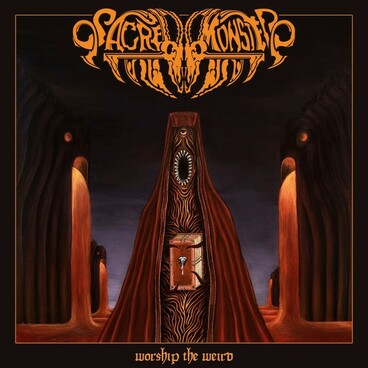
My music-listening experience this winter has been haunted by an intriguing conundrum. At any given moment I have the option of subjecting myself to a bevy of new music from an impossibly wide range of genres--music that I will inevitably find enjoyable. But an alternative perpetually looms: listen to Sacred Monster’s stunning debut yet again. From a purely mathematical standpoint, the latter option ranks supreme. This album has flesh-rending hooks, and putting it down has been a genuine struggle. The year--despite still in an admittedly infantile stage--has been concretely defined by Worship The Weird, and I'm honored and excited to have the opportunity to share it with you today. For those of you lookin' to get directly to the good stuff, you can find Worship the Weird streaming in full below.
As described in our review/stream of lead single “High Confessor,” Sacred Monster’s aesthetic is a peculiar (and wholly singular) blend of Gloryhammer’s campy exultance, spliced through the riff-centric approach of Orange Goblin. Why Gloryhammer? Despite not wanking around the sonic confines of power metal heaven, Sacred Monster apply a palpable sense of nerdy excitement to everything they touch. When it comes to being fans of weird shit, Sacred Monster is an unabashedly jubilant outfit, and their energy is infectious beyond cure. Joe Abercrombie, Twilight Zone, Stephen King’s Gunslinger, Lovecraftian existentialism, and the general ambiance of prosthetic-laden horror are all on gratuitous display. Goofy it may be, but it’s most certainly not fluff. Despite cheesy subject matter, Sacred Monster are undeniably worldbuilders and storytellers--and, even when those fantastical elements technically belong to some other creative entity, these interpretations are never simple re-hashery. Take, for example, the explicit Twilight Zone worship of “Nightmare at 20,000 Feet.” Despite maintaining a firm grasp on frankly ridiculous material, this hard-hitting track takes a turn as its narrator appears...sympathetic? It's all oddly endearing. Sacred Monster's sound is honestly difficult to describe, due largely to an expansive palette of instrumental influences. While riffage is generally omnipresent and blocky in stature, it recalls a variety of genre, from the hefty footprints of stoner doom to the galloping drive of NWOBHM. Despite a fairly fuzz-free application, the aforementioned Orange Goblin’s aggressive bite-first-ask-questions-later approach is apparent. Meanwhile, the general heft recalls, at times, the carpet-bomb'd groove of Corrosion of Conformity, as well as the bluesy hard-rockin’ appeal of Danzig or Clutch. Because the guitar tone is so pleasantly modern, I almost hesitate to mention Pentagram, but a certain Griffen-esque willingness to gleefully cram riff after superb riff into a track remains a defining characteristic. No question: Robert Nubel, the appointed Riff Finder General, knows how to write 'em gnarly and mean. Nothing here feels derivative, overused, or otherwise tired...and for a band that falls, tangentially, into the stoner doom category, that’s a goddamn accomplishment. Melodic intros and occasion blazing solo reinforce the General as a formidable force. One-trick-pony he is not. Sacred Monster is relentlessly uptempo, and so, not to be outshone, Guillermo Moreno and Ted Nubel--Bishop of the Bottom End and Priest of Percussion, respectively--keep things consistently intriguing. Guitar-centric songs all-too-oft feel shallow, but here, a tangible weight is carried throughout. Sacred Monster contends with some obvious star power, and it is to their credit that the band so clearly operates as a unit. Worship the Weird is relentlessly solid. Stoic, even. There's not a track here that suffers from undercooked songwriting or unbalanced arrangements, and as a result, Side B fares just as well as Side A at delivering uniquely kooky material wrapped in brobdingnagian heft.
Speaking of star power: I give you Adam Szczygieł, The Minister of Screams Himself. This man has an unbelievable range, from the guttural roars of “Re-animator,” to the throat-wrenching chant of (standout track) “Face of My Father,” to the King Diamond-esque wails scattered, liberally, throughout. The vastly divergent vocal techniques employed only adds to the substantial interest, and it is to Szczygieł’s credit that one never really knows what to expect. Forget the thematic trappings: this man is a monster unto himself.
Sacred Monster is wondrously proficient, approaching the madness of the Frankenstein-ian protagonist of "Re-animator" in their uncanny ability to execute an appropriately weird vision. With Worship the Weird, they deliver what is easily the most straight-up entertaining album to lay siege to the Sleeping Village's walls in a very, very long time. In promo material, Sacred Monster invites listeners to “celebrate...the unexplainable and the inescapable; the shapes just outside the corner of your eye. Pay tribute to the beasts that haunt your dreams and their creators. Join with us in wicked ceremony to give praise to the things that lurk below, outside space, and just beyond your door.” For once, I actually believe the hyperbole, and in this way, Worship the Weird is as much of a mission statement as it is a ritualistic command. I, for one, am obliged to bow my head in supplication of the strange. Needless to say, this album comes at the highest order of recommendation. Sacred Monster's Worship the Weird will be released March 1st. In the meantime, listen to the album in full here:
If you’re in Chicago, join me in welcoming this behemoth of a record into the world at Sacred Monster’s album release party, presented by Forever Deaf. This Friday, LiveWire lounge. Be there.
Sacred Monster can be found: Bandcamp 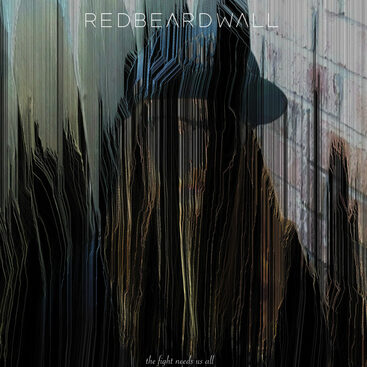 Once I know something about a musician’s character, separating that knowledge from the fruits of their labor can be, well, a laborious affair. In the case of Red Beard Wall, that certainly isn't a bad thing. Judging from our interactions, I have gathered that whatever the red-bearded frontman Aaron Wall does, he does with the utmost enthusiasm and fervor. Take, for example, his online comments, which remain an ALL HAIL hailstorm of goat and flame emojis. His persona’s omnipresence feels remarkably sincere, and is always realized with noteworthy vivacity--which, in turn, results in a unique sound solidly founded on glorious zeal. Less we get too highfalutin, let me state the obvious: Red Beard Wall is also really fucking weird. Rest assured, this slumbering villager likes weird. Weird is what gets me up in the morning, and The Fight Needs Us All is the epitome of this oddball brand I have come to wholeheartedly enjoy. Several months back we ran a brief review of “The Warming,” lead single from the Wall’s sophomore effort. While recycling may be in bad form, these are words I stand by: “Red Beard Wall plays a wickedly cacophonous brand of sludge--a brutal slugfest between the hooky pseudo-melodic stylings of Torche or Helmet, and the bayou groove of NOLA’s finest...this is sludge rock at its best--thick, unique, and relentlessly repeatable. It’s a rabble-rouser, a neck-snapper.” At the time, “The Warming” seemed a distillation of the components that make this project so special...and now, given wider vision, I consider it the focal point of the album. No question: “The Warming” is truly the hottest track amongst a cabal of barn-burners. The obvious first stop on the road to dissecting the Red Beard Wall methodology is the two-tongued vocal style, split between throat-wrenching screams and along-the-riff cleans. It’s a real Jekyll/Hyde situation, and throughout the album, Wall continually pulls off the odd juxtaposition with a delightfully bludgeoning grace. While contrasting vocals certainly aren’t new in the world of sludge nor rock, there is little out there that demonstrates a similarly visceral approach. And while this dichotomy has always been the outfit’s strongest suit, both forms of delivery have improved significantly from debut in several ways. The screams are increasingly savage, in the pent-up-animal sense of the word. Conversely, Wall’s cleans are employed with increased regularity, adding a much-needed melodic focus to the pummeling riffs. The guitar itself is utterly sasquatchian--never floundering in whimsy, but remaining rooted in straightforward groove. There’s glimmers of influence here, from the scuzzy heft of early Bill Kelliher, to the head-bopping flow of Siamese Dream-era Billy Corgan. Thick and heavy, the guitar remains a cornerstone for the vocal acrobatics. The back-to-back punch of “Come On Down” and “To My Queen” is a prime example of this technique in practice. And! Lest they be forgotten, the militaristic drums match the riffage in terms of aggression and sheer weight, pound-for-pound. Viewed as a whole, The Fight Needs Us All is a bloody bout, rather than an exercise in instrumental harmony. The album is compulsively listenable and endlessly enjoyable, yet from a songwriting perspective, there are some oddly paradoxical challenges. The general structure is unique, but that uniqueness doesn’t indicate an overly sophisticated plane of songwriting. This results in a number of Side-B moments recalling--perhaps too strongly--that which came before. Realistically, a weird approach becomes less weird each time you hear it, and for this reason, some variety throughout would accent the potency of Red Beard Wall’s core motif. That said, existing breaks in the formula do contribute significantly to the beginnings of a balance. The doomy instrumental ambiance of “Reverend.” The slower moments of “Tell Me The Future of Existence,” which recalls early Mastodon at their most somber--think “Trilobite.” The alt-rock pace at which clean vocals passages weave between riffs on the aforementioned “Ode to Green.” Given Wall’s obvious ability to seamlessly break (and subsequently bridge) genre expectations, I’m hopeful that the future bodes well for continued experimentation. A wall may be stationary by definition, but with two high-quality albums at this stage, Red Beard Wall is dealing with the kind of structural stability that allows for flourishes. Y’know, ramparts and gargoyles and shit. The Fight Needs Us All builds on the promise Red Beard Wall previously displayed, and, for the sake of comparison, this album has spent more time pummeling my eardrums than any other this month. It’s ridden with meaty hooks and melodic swells. It’s relentlessly repeatable, passionately aggressive...and just off-kilter enough to merit a double-take. As the soundtrack to a purported revolution, it remains as invigorating as ever. In sum? Red Beard Wall requests--nay, demands--your presence at the fight. All Hail! Red Beard Wall - The Fight Needs Us All was released Feb. 22nd from Argonauta Records. 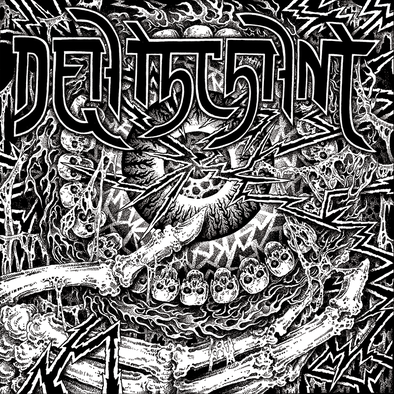 Like any other, our little Village has its little pranksters and jokesters, and theirs is a crude, unsophisticated humor. We don’t get much wit nor deadpan ‘round these parts, so when someone rolls into town possessing the unique ability to keep a straight face whilst performing something capriciously off-kilter, I tend to be suitably impressed. This isn’t to say that LA’s heavy rockin’ Deathchant don’t take their art seriously. To the contrary, in fact. It’s quite obvious that TJ Lemieux and Company (John Bolino, Colin Fahrner and George Camacho) are very accomplished musicians, and their debut LP is, frankly, quite the stunner. Rather, I’m suggesting that what makes Deathchant so unique is the ability to launch into experimental passages and then out again with nary a glance backward, maintaining the guise that they’ve been playing a standard heavy rock number the whole damn time. At first, the casual nature in which a track--such as opener Pessimist--slips from recognizable psychedelic fare into a passage inhabited by a post-singularity beehive before ending back at Lemiuex’s sultry, fuzz-laden voice is....unexpected, to say the least. Very quickly, however, this becomes a trademark motif. A similar compositional technique rears its head in album highlight Ritual, which turns a seemingly driving intro riff into an extended experiment in psychedelia, before devolving (or evolving?) into pure noise. It's a neat trick, and Deathchant's ability to maintain composure throughout sells the package. Because these four switch things up so frequently and unexpectedly, it remains difficult to peg them--both in the case of the direction of individual tracks, as well as the general genre. It has the brooding weight of a new-age doom act, but there’s a propulsive heavy metal element, as well as a distinctly avant-garde jazz ambiance. For a prime example of the latter, look to the somber Eulogy. Closer Trigger is the most aggressive track, the most outwardly “metal,” but still, that’s excluding the extended intro and outro, which are entirely constructed from the reverb-drenched strains of an organic brand of industrial noise. Its weird stuff, and from a standpoint of both personal preference and critical awareness, Deathchant’s formula (if it can even be referred to as such) works very well. The unique song structures prevent a dull consistency that I unfortunately have come to expect from both heavy psych and noise. Beyond that, each track is goddamn interesting on its own merits. There isn’t a song here that doesn’t brings its own flavor to the Deathchant universe, and that is something to celebrate. Despite the obvious jarring nature of the more noisy elements, a melodic and near-harmonious air hangs, hazily, over the whole affair. The vocals are delightfully laid-back, yet richly emotive when needed. Instrumentally, there are no weak links. Drums, as mentioned, possess a jazzy bent--but they also lay it down with a fierce intensity when the occasion arises. The guitar holds that lovely distortion in loving arms, and whether plodding or bursting into an impromptu canter, that sweet psychedelic tone is never abandoned. Despite remaining unpredictable, Deathchant knows how to comfort their listeners. Critically speaking, the only real item of note is the length. At 29 minutes, this hardly qualifies as a full album in my (admittedly self-published) book. The fact that I want more is, if anything, a testament to the strength of what these rockers have conjured up. While this groggy wordsmith might not have the vocabulary to accurately describe what exactly Deathchant have created here, I will say this with certainty: whatever it is they do, they’ve done it with great skill and aplomb. Needless to say: highly recommended! Deathchant arrives January 10th of next year, courtesy of King Volume Records. In the meantime, both singles--Hex and Pessimist--are available for streaming. Otherwise, we highly recommend you saunter, levitate, or otherwise ooze your way over to that pre-order. It’s really not the sort of decision you’ll end up regretting.  Lest the masses be confused: I am decidedly an album guy. A truly well-conceived arrangement of tracks, designed with the explicit purpose of flowing and interlocking with deliberate grace--for me, this is the holy grail of the music-listening experience. With that said, this month has been all about the singles, evidenced best by the number of goddamn times I’ve hit repeat on Red Beard Wall’s (certifiably) unstoppable latest. For those of you not in the know, RBW plays a wickedly cacophonous brand of sludge--a brutal slugfest between the hooky pseudo-melodic stylings of Torche or Helmet, and the bayou groove of NOLA’s finest. Here, the formula hasn’t changed all that much, thank the lord. Given past experiences I went in expecting a lot, and this track absolutely brings it in the execution department, due in large to the multifaceted vocal delivery. Raspy roars one moment, chant-along-the riff cleans the next. It’s a delicious recipe, to be sure, accented by crunchy, head-bopping riffage and some absolutely crushing work in the percussion department. This is sludge rock at its finest--thick, unique, and relentlessly repeatable. It’s a rabble-rouser, a neck-snapper. As a single, The Warming does its job...inordinately well. Red Beard Wall’s (excellent, I assure you) sophomore album, The Fight Needs Us All, releases Feb 22nd from Argonauta Records. Full review shall follow in good time. In the meantime, we Villagers, effectively woken from our slumber, highly recommend you find your way over to that preorder. Red Beard Wall can be found Bandcamp 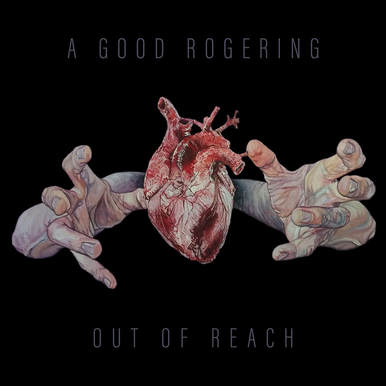 Whilst compiling, cross-referencing, and copy-editing the Great Year End List of ‘18, the walls of our slumbering Village were battered by the tides of death and doom. As a result, some calmer tides are in order, and those gentle swells are brought to us today in the form of a single from Austin’s own A Good Rogering. Described briefly (if...not inaccurately) as “non-metal,” Out Of Reach demonstrates a stark contrast to AGR’s typical brand of eclectically raucous heavy rock. 2017’s EP, the ridiculously enjoyable and irreverently entitled This Is Death Metal, sets a much more electric tone. This release, as with AGR’s prior work is groovy, bouncy, and wonderfully off-kilter. Wearing the aesthetics of feel-good heavy rock on their sleeves, this outfit was seemingly slotted into a singular Primus-meets-Manowar category of their own. Out of Reach, then, is a stark change, yet not unwelcome. In the same way that both Alice In Chains and The Smashing Pumpkins are instantly recognizable by their uncanny ability to provide well-written tracks across the spectrum from crunchy to acoustic, AGR proves that they have an apparent bevy of tricks up their sleeves. Here, the Alice In Chains comparison feels particularly apt, as the vocal delivery adopts a certain laid-back Staley vibe. The track builds in intensity, but never breaks into blustery rock ‘n’ roll rodomontade. A true testament to AGR’s ability to write a compelling tune. The vocal melodies are plenty hooky, no hefty riffs necessary. Much like the grunge of my childhood, Out Of Reach scratches that introspective, melancholic itch quite handily. The acoustics are presented with a competent grace, the chorus is a real earworm, and the lyrics, while suitably dark, remain comforting. All is well. AGR is due for an album this coming year, and if it manages to balance the quiet emotive numbers such as this with their more heavy-handed side, I will be suitably impressed. With that said, Out Of Reach hasn’t left rotation for weeks, and with songwriting this good, I can expect the best. Our recommendation? Check it out on spotify, post-haste. A Good Rogering can be found: Official Website Bandcamp 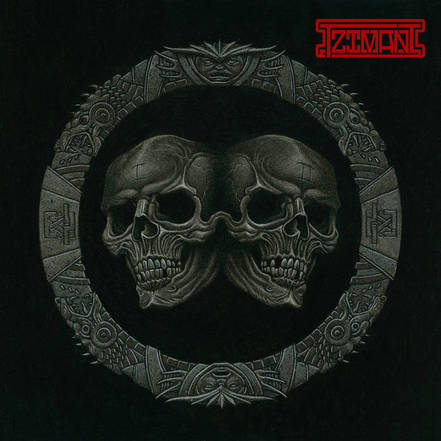 Well, this is refreshing. Typically, when promo proclaims that a band represents a "bold new take" on a traditional, well-trod style, you can expect the same: yet another forgettable "revitalization" of a sound and aesthetic that has been done to death, reanimated, and then slaughtered by copycats once more. In the case of Tzimani, the status quo is effectively put in its place. Despite sparking synapses associated with a variety of high-octane hard rock and metal birthed in the days of yore, this self titled debut EP genuinely feels fresh-faced. Pull on your leather, put the pedal to the metal, and smell the gasoline: Tzimani begins with menacing distortion, a rumbling engine of Mad Max-ian proportion. Modern trad metal works best when A. the songwriting feels like it has been dredged from the past, and B. the musicianship sounds like the result of decades worth of practice. Here, the brotherly duo--frontman Eddie Vazquez and drummer Sebastian Vazquez--are certainly beyond their years in terms of skill. The instrumentality is remarkably tight for such untested newcomers, and the writing reflects an unprecedented maturity. These seem like tracks resulting from years of failure and eventual triumph. Take, for example, We Are the Ones, a blazing number that begs for repeat listens. It’s catchy as hell, with appropriately corny lyrics and a lot of gleeful rock ‘n’ roll presence. This is all due to a predictable structure, but Tzimani aren’t trying to reinvent the wheel here, so much as play tunes that would have undoubtedly filled stadiums--had they the good fortune to be released 30 years earlier. Drums are tight and precise, the bass is audible enough to leave a sizable impact, and the vocals are surprisingly flexible. Eddie has a decent range, and he isn’t afraid to throw some vaguely Hagar-influenced inflection into the triumphant refrains. While Tzimani is impressive on all counts, the nail in the coffin of this EP’s success is the brilliant display of axemanship. Face-melting solos, finger-blistering arpeggios, and a Skull Fist’d shred’s-not-dead approach to riffage is worth the price of admission alone. While never flying off the handle or stooping to mere wankery, a vibrant enthusiasm for flashy displays of technique is evident in Eddie’s highly skilled fretwork. The solos absolutely rip--'nuff said. His ability to craft galloping NWOBHM tinged riffs and licks with a distinct sneering competency a la Motley Crue, and the earworm sensibilities of the aforementioned Skull Fist--or perhaps Def Leppard--is truly something to behold. There's definitely a little Maiden in there as well, which only adds to the splendor. Originality is always going to come into question, and while this all feels necessarily familiar, it doesn’t feel, well, done. The Crue Connection, for example, is most apparent in closer Get Me Out Of Here, which recalls Kickstart My Heart's central theme, yet comfortably reinforces Tzimani’s (already established) trademark: balls-to-the-wall momentum. This track proves that these guys aren't here to let off the gas and coast in the strength of a couple tracks, allowing listeners to flounder in the filler and fluff so often associated with this brand of hard rock. To be frank, there isn't a track here that would seem out of place as a high-octane radio single. It sounds cliche, but the greatest weakness of this EP is just that--it’s only an EP. When Tzimani drop an album proper, they are undoubtedly going to become recognized as a force to reckon with in the face of revitalized American metal. This monster has swiftly climbed the list into my top 5 EP’s of 2018 (spoiler!) and thus comes highly, highly recommended.  Lest the masses be confused: I am decidedly an album guy. A truly well-conceived arrangement of tracks, designed with the explicit purpose of flowing and interlocking with deliberate grace--for me, this is the holy grail of the music-listening experience. With that said, this month has been all about the singles, evidenced best by the number of goddamn times I’ve hit repeat on Red Beard Wall’s (certifiably) unstoppable latest. For those of you not in the know, RBW plays a wickedly cacophonous brand of sludge --a brutal slugfest between the hooky pseudo-melodic stylings of Torche or Helmet, and the bayou groove of NOLA’s finest. Here, the formula hasn’t changed all that much, thank the lord. Given past experiences I went in expecting a lot, and this track absolutely brings it in the execution department, due in large to the multifaceted vocal delivery. Raspy roars one moment, chant-along-the riff cleans the next. It’s a delicious recipe, to be sure, accented by crunchy, head-bopping riffage and some absolutely crushing work in the percussion department. This is sludge rock at its finest--thick, unique, and relentlessly repeatable. It’s a rabble-rouser, a neck-snapper. As a single, The Warming does its job...inordinately well. Red Beard Wall’s (excellent, I assure you) sophomore album, The Fight Needs Us All, releases February 22nd from Argonauta Records. Full review shall follow in good time. In the meantime, we Villagers, effectively woken from our slumber, highly recommend you find your way over to that preorder. Red Beard Wall can be found: Bandcamp 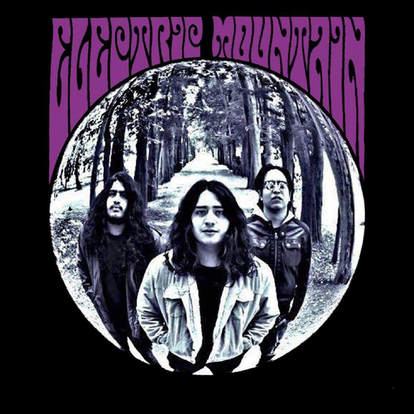 Despite Homme’s declaration that Kyuss was inspired more by Black Flag than the progenitors and perfectors of psychedelic heavy rock--say, Blue Cheer or Black Sabbath--the desert rock scene’s worship of the amp and riff are surely tied to the ingenuity of early doomsters. Because Sabbath have left such a veritable canyon in the firmament of heavy music, we dedicate Sundays to highlighting a lesser-known band that carries, in some fashion, the Sabbathian mantle. Today we review Electric Mountain’s s/t debut, straight outta Mexico City on the wings of inspirations aplenty. Welcome to Sabbath Sunday. At this point in the Sleeping Village’s doomy coverage, it feels a little cliche to declare, but here goes: Electric Mountain doesn’t deal in subtilty. Borrowing Kyuss’ thick riffs and Orange Goblins aggressive percussive flair, this meaty and otherwise fuzz-tastic take on the belov’d stoner rock template remains a highly enjoyable listen, despite zero intention of breaking the mold. And yes, I can harp on the unoriginality here, but while the formula remains consistent, there really isn’t a bad track on this slab. Upon many repeated listens, Going Under and Green Mountain Side are clear standouts, especially if you’re particularly diggin’ the crunchy Black Pyramid vibes. Into the Maelstrom provides that crisp mid-album acoustic flavor, and Free Woman/Space Rocket provide that feisty one-two punch in the album’s early stages. This is a lesson in hookiness--with riffs characterized by near-sensual groove and a near-impenetrable haze, fuzz idolatry is the name of the game. Gib’s filtered vocals are distance and tinged with a forthright familiarity, serving as an effective sidekick to his joyously energetic guitar. Bouncing from riff to lick and back again, there are no slow moments here. While the occasional riff does recall earlier tracks, each song has its own unique identity. Electric Mountain as a whole squarely hits the mark in terms of length--long enough to satisfy, brief enough to incite a round of questioning: what will they deliver next? If your relationship with rock of the overt desert and psychedelic varieties can be qualified as mere flirtation, Electric Mountain might not be the introduction necessary to sway you over into the riff-filled land. That said, fans of the genre with undoubtedly find this debut a significantly worthwhile affair. Electric Mountain was released this November from Electric Valley Records
Electric Mountain can be found at: Bandcamp |
Welcome!
We provide thoughtful reviews of music that is heavy, gloomy...and loud enough to wake us from slumber. Written by a highfalutin peasantry!
|


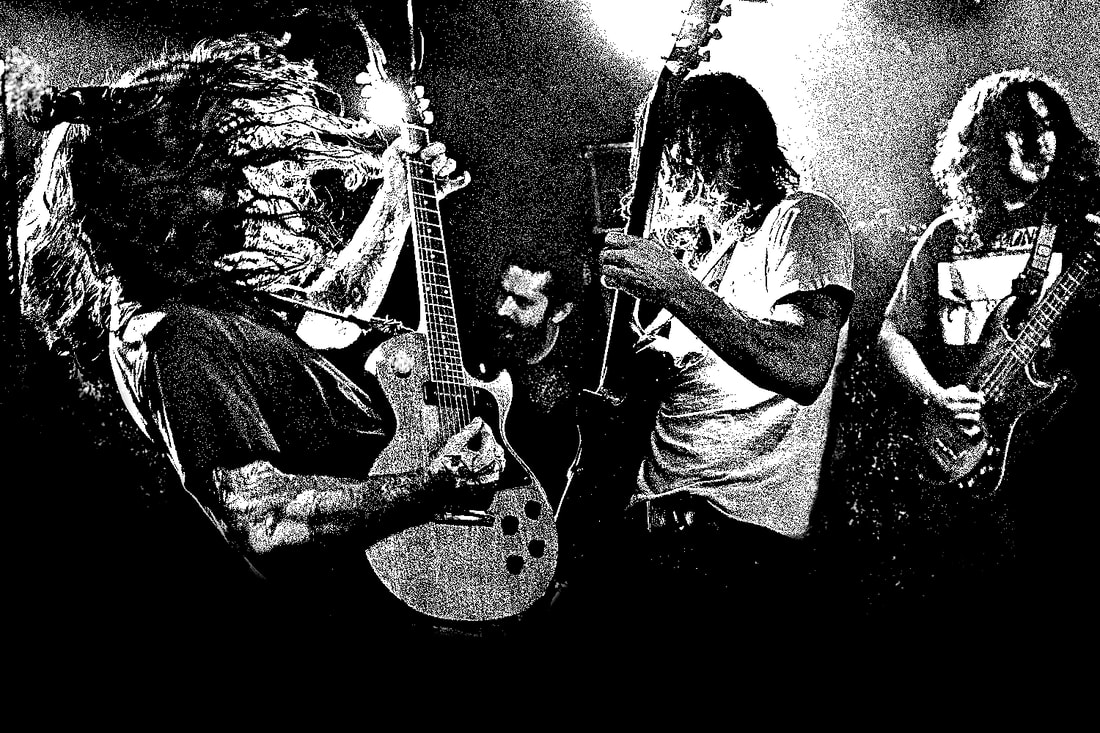

 RSS Feed
RSS Feed